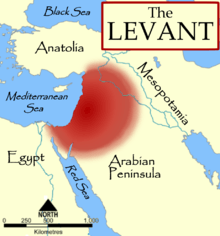Definify.com
Webster 1913 Edition
Levant
Le′vant
(lē′vant)
, Adj.
[F., p. pr. of
lever
to raise.] (Law)
Rising or having risen from rest; – said of cattle. See
Couchant and levant
, under Couchant
. Le-vant′
(lē̍-vănt′)
, Noun.
[It.
levante
the point where the sun rises, the east, the Levant, fr. levare
to raise, levarsi
to rise: cf. F. levant
. See Lever
.] 1.
The countries washed by the eastern part of the Mediterranean and its contiguous waters.
2.
A levanter (the wind so called).
Le′vant
(lē′vant; 277)
, Adj.
Eastern.
[Obs.]
Forth rush the
levant
and the ponent winds. Milton.
Le-vant′
(lē̍-vănt′)
, Verb.
I.
[Cf. Sp.
levantar
to raise, go from one place to another.] To run away from one’s debts; to decamp.
[Colloq. Eng.]
Thackeray.
Webster 1828 Edition
Levant
LE'VANT
,Adj.
Eastern; denoting the part of the hemisphere where the sun rises.
Forth rush the levant and the ponent winds.
Definition 2026
Levant
Levant
See also: levant
English
Proper noun
Levant
- The countries bordering the eastern Mediterranean Sea, namely Syria, Lebanon, Israel, Palestine, Jordan and Cyprus (and sometimes also including Turkey and Egypt).
- An easterly wind, generally in the western Mediterranean Sea
Synonyms
- (wind): levanter
Antonyms
Derived terms
Translations
the countries bordering the eastern Mediterranean Sea
|
External links
-
 Levant on Wikipedia.Wikipedia
Levant on Wikipedia.Wikipedia
-
 Levant (wind) on Wikipedia.Wikipedia
Levant (wind) on Wikipedia.Wikipedia
Anagrams
French

Levant
Pronunciation
- IPA(key): /lə.vɑ̃/
Proper noun
Levant m
- (dated) Orient (the countries of Asia)
Anagrams
Serbo-Croatian
Pronunciation
- IPA(key): /lěʋant/
- Hyphenation: Le‧vant
Proper noun
Lèvant m (Cyrillic spelling Лѐвант)
- Levant (Eastern Mediterranean)
Declension
Declension of Levant
| singular | |
|---|---|
| nominative | Levant |
| genitive | Levanta |
| dative | Levantu |
| accusative | Levant |
| vocative | Levante |
| locative | Levantu |
| instrumental | Levantom |
levant
levant
See also: Levant
English
Pronunciation
- IPA(key): /lɪˈvænt/
Noun
levant (plural levants)
- A disappearing or absconding after losing a bet.
Verb
levant (third-person singular simple present levants, present participle levanting, simple past and past participle levanted)
- To abscond or run away, especially to avoid paying money or debts.
- 1885, Sir Richard Burton, The Book of the Thousand Nights and One Night, Night 16:
- In a mighty little time their husbands played them false and, taking whatever they could lay hands upon, levanted and left them in the lurch.
- 1922, James Joyce, Ulysses:
- He died of a Tuesday. Got the run. Levanted with the cash of a few ads.
- 1885, Sir Richard Burton, The Book of the Thousand Nights and One Night, Night 16:
Translations
to abscond or run away
Etymology 2
Pronunciation
- IPA(key): /ˈlɛvənt/
Adjective
levant (not comparable)
- (heraldry) Rising, of an animal.
- (law) Rising or having risen from rest; said of cattle.
- (poetic) Eastern.
- Milton
- Forth rush the levant and the ponent winds.
- Milton
Anagrams
French
Etymology
Participle adjective of lever (“to raise”). Cf. also Latin levans; compare Italian levante.
Pronunciation
- IPA(key): /lə.vɑ̃/
Adjective
levant m (feminine singular levante, masculine plural levants, feminine plural levantes)
- (of the moon, the sun, etc.) rising
Noun
levant m (uncountable)
Verb
levant
- present participle of lever